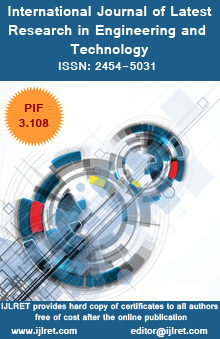[Vol. 06, No. 10] [October 2020]
- Citation
- Abstract
- Reference
- PDF Download
| Paper Title | :: | Hydrogen Supply Chains – New Perspective for Stabilizing Power Grid |
| Author Name | :: | Marzena Frankowska || Andrzej Rzeczycki |
| Country | :: | Poland |
| Page Number | :: | 01-07 |
Today's energy systems increasingly rely on renewable energy sources. However, the energy potential of these solutions is not stable. This means that there will always be a supply and demand imbalance in this respect. Therefore, it becomes extremely important to create a hydrogen supply chain system that stabilizes the operation of the electricity network in the long term. The article shows the possibility of converting energy into hydrogen, which has many potential utility properties, including the possibility of changing it back into electricity. The assumptions for the integration of renewable energy sources with the power grid through hydrogen supply chain have been presented.
Keywords: energy storage, energy system stabilization, hydrogen production, hydrogen supply chain, power grid, renewable energy sources
Keywords: energy storage, energy system stabilization, hydrogen production, hydrogen supply chain, power grid, renewable energy sources
[1]. H. Zhao, Q. Wu, S. Hu, H. Xu, C. Nygaard Rasmussen, Review of energy storage system for wind power integration support, Applied Energy, 2015, 137, 545-553.
[2]. I. Staffell, D. Scamman, A. Velazquez Abad, P. Balcombe, Paul E. Dodds, P. Ekins, N. Shah, K.R. Warda, The role of hydrogen and fuel cells in the global energy system, Energy Environ. Sci., 2019, 12, 463—491.
[3]. IEA, The Future of Hydrogen, IEA, 2019, Paris, https://www.iea.org/reports/the-future-of-hydrogen [20.07.2019].
[4]. I. Dincer, C. Zamfirescu, Sustainable energy systems and applications, Springer Science & Business Media, 2011, p. 524.
[5]. Pale Blue Dot., Hydrogen Supply Chain Mapping Report, 2018, 8, https://northsearegion.eu/media/9504/hydrogen-supply-chain-mapping-report-30.pdf [18.07.2020].
[2]. I. Staffell, D. Scamman, A. Velazquez Abad, P. Balcombe, Paul E. Dodds, P. Ekins, N. Shah, K.R. Warda, The role of hydrogen and fuel cells in the global energy system, Energy Environ. Sci., 2019, 12, 463—491.
[3]. IEA, The Future of Hydrogen, IEA, 2019, Paris, https://www.iea.org/reports/the-future-of-hydrogen [20.07.2019].
[4]. I. Dincer, C. Zamfirescu, Sustainable energy systems and applications, Springer Science & Business Media, 2011, p. 524.
[5]. Pale Blue Dot., Hydrogen Supply Chain Mapping Report, 2018, 8, https://northsearegion.eu/media/9504/hydrogen-supply-chain-mapping-report-30.pdf [18.07.2020].
- Citation
- Abstract
- Reference
- PDF Download
| Paper Title | :: | Research on Actual Mixed Flow Production Line Scheduling Considering Shift and Machine State Constraints |
| Author Name | :: | Qiaofeng Meng |
| Country | :: | China |
| Page Number | :: | 08-18 |
Based on the actual production requirements, this paper studies the key issues of the mixed flow production line scheduling in the digital machine shop. Considering the shift constraints and machine state constraints, a robust scheduling algorithm is proposed. For the shift constraint, that is, the process must be arranged to the corresponding shift time of the machine, a time slice mapping mechanism is proposed to improve the efficiency of the algorithm. The algorithm considers the availability of the machine and the currently determined machine load in the machine allocation for the deterministic state constraint. The deterministic state requires that the current machine state be considered when arranging the machine. There are mainly three states: good, damaged and time-limited maintenance. Only when the machine is in good or non-maintenance state at the current time, the processing can be arranged on the machine. Non-deterministic state refers to the uncertainty machine load. Uncertain machine load refers to the load caused by the arrival of random orders, machine failures and scheduling changes. The uncertain machine has a non-negligible effect on the scheduling results. The efficiency of a robust scheduling algorithm that considers shift constraints, predicted non-deterministic machine load components, and deterministic machine load components is verified by the simulation. Applying the scheduling method proposed in this paper to the actual machine shop mixed-flow production line scheduling, it can adjust the production cycle, rationally assign tasks, balance production load and avoid bottleneck machines, realize efficient operation of production lines, maximize resource utilization and meet the actual production management needs of manufacturing enterprises.
Keywords: mixed-flow production line scheduling; machine state constraints; shift constraints; time slice mapping mechanism.
Keywords: mixed-flow production line scheduling; machine state constraints; shift constraints; time slice mapping mechanism.
[1]. Li X., Gao L., Zhang C., et al. A review on integrated process planning and scheduling. Int J Manuf Res, 2010, 5:161–180.
[2]. Guo Quanjie. Simulation and optimization of aluminum alloy door and window mixed flow production line based on digital factory [Master's thesis]. Jinan: Shandong University, 2015.
[3]. Tian Zhipeng. Research and application of stamping shop scheduling and assembly line sequencing method for automotive mixed flow production [PhD thesis]. Wuhan: Huazhong University of Science and Technology, 2016.
[4]. Lin J, Luo D, Li X, et al. Differential Evolution Based Hyper-heuristic for the Flexible Job-Shop Scheduling Problem with Fuzzy Processing Time. Simulated Evolution and Learning. 2017:75-86.
[5]. Nouiri M, Bekrar A, Jemai A, et al. An effective and distributed particle swarm optimization algorithm for flexible job-shop scheduling problem. Journal of Intelligent Manufacturing, 2018:1-13.
[2]. Guo Quanjie. Simulation and optimization of aluminum alloy door and window mixed flow production line based on digital factory [Master's thesis]. Jinan: Shandong University, 2015.
[3]. Tian Zhipeng. Research and application of stamping shop scheduling and assembly line sequencing method for automotive mixed flow production [PhD thesis]. Wuhan: Huazhong University of Science and Technology, 2016.
[4]. Lin J, Luo D, Li X, et al. Differential Evolution Based Hyper-heuristic for the Flexible Job-Shop Scheduling Problem with Fuzzy Processing Time. Simulated Evolution and Learning. 2017:75-86.
[5]. Nouiri M, Bekrar A, Jemai A, et al. An effective and distributed particle swarm optimization algorithm for flexible job-shop scheduling problem. Journal of Intelligent Manufacturing, 2018:1-13.


